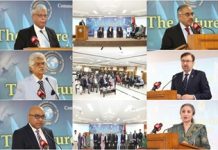The lawyers’ associations are important, but are only one element in the overall struggle for democracy in Pakistan. They must gather the support of other civil society groups to sustain the movement
The democratic transitions that we have witnessed in the recent past in Eastern Europe or Latin America came about with activist and effective democratic civil societies that worked as an ally of the political forces. It is necessary to make a distinction between democratic and non-democratic civil society, as the latter chooses violence as its weapon and has ambitions to capture the state. A democratic civil society, on the other hand, functions within the limits of law, is internally democratic and works in the public sphere to make the state responsive, accountable and transparent; and constrains it to not transgress its constitutional limits.
Such a civil society plays a critical role not just in supporting a transition to democracy, but also during democratic consolidation when the shift from authoritarianism to representative government has taken place. It is, however, questionable if civil society alone can lead a democratic revolution in any society. At best, it can be a vital component of a larger democratic movement and help sustain it until a real change in the political order has occurred. And its role does not end there: it must continue to assist in promoting civic culture, encouraging citizens’ participation in the political process and recruiting new leadership.
Democratic movements in our time are revolutionary in character for they attempt to restructure the system of governance according to modern principles of popular sovereignty, and shift political power from autocratic/authoritarian/oligarchic rule to representative government. These movements acknowledge the worth of ordinary people, equality of rights and campaign for representative government; these ideas have roots in the Western philosophical tradition. Social movements over the last few centuries across the world have sought to establish people’s rule for that is the only form of government that can be considered representative of the needs and aspirations of society.
Democratic movements differ from classical revolutions in the sense that they have been, and should be, non-violent and they seek change in the system by changing its fundamental rules. These movements focus on social and political mobilisation and their weapons are civil disobedience and peaceful protest.
Democratic movements of Pakistan in the past have applied some of these tools, but apart from toppling two incumbents, they have not achieved any substantial gains. The military, waiting in the wings, took over, quite opposite to the objectives of the movements. Now there is a new movement in the making, surrounded by vastly changed social and economic circumstances in the country. One of the key features of this new movement is civil society activism.
Pakistan’s civil society has been growing for the past two decades in various spheres of social life. Its traditional focus has been on human rights, especially minorities and women, and on social development in rural communities. Its fresh focus is on rule of law, representative government and democracy as a universal social value. While activism in these areas grew appreciably, the traditional associations, like labour unions and student groups that had played a major role in toppling Ayub Khan and crippling Zulfiqar Ali Bhutto’s government, declined.
After several dormant decades, the traditional civil society of Pakistan is undergoing a major change, redefining its vision and role. Its components are not the same as they were in the anti-Ayub movement, which was truly broad-based, or the anti-Bhutto movement. The students unions that brought thousands on the street are no longer active for democracy, except a faction of students allied with the Jamaat-e Islami.
The new movement for democracy, led by lawyers’ associations from all over the country, was spurred by General Musharraf’s action against the Chief Justice of Pakistan. The question is, can the lawyers, on their own, lead the movement to the next stage of democratic transition?
Democratic movements are collective social enterprises and represent all major sectors of the society. The lawyers’ associations are important, but are only one element in the overall struggle for democracy in Pakistan. They must gather the support of other civil society groups to sustain the movement. The lawyers have shown remarkable solidarity and tenacity but they cannot go it alone.
Opposition political parties along with their subsidiary groups; students; labour; intelligentsia and the business community could help drive the current movement towards its final goal of democracy. It is difficult to see that happening in the immediate future as the main opposition parties, much like the ruling coalition, are essentially elite groups. They have shallow roots in society and reach their electoral base through local influentials.
Also, they do not have democratic structures within their parties. Nor does their past performance inspire confidence in the growing urban and sub-urban middle classes of Pakistan. The religious political parties are the only exceptions that might be relatively more effective in bringing their supporters out on the streets but that is not what would define a social movement for democracy, which must be inclusive and broad-based.
Perhaps the Pakistan People’s Party could be a critical factor in giving the opposition movement some measure of popularity and a greater social support base. If all the political parties had stood together on the issue of restoring parliamentary democracy under the 1973 Constitution, it would have given the social energy needed by the currently fragmented democratic movement. For reasons its chairperson understands better than the rest, the PPP seems to be sitting on the fence. The transition that Benazir Bhutto claims to achieve is not through deals but through open collective action, which is possible as the regime and its allies have lost legitimacy and can only prolong their stay in power via intimidation and manipulation of the law.
Another fact of Pakistani politics is that the coalitions of elites from different political parties tend to cooperate with the military to keep the political dispensation in their favour. This has been a regular pattern since Ayub Khan captured power in 1958. Once again, elite realignment is taking place with the consideration that the PPP will share power with other groups under the leadership of a re-elected Musharraf, if he is not prevented by the Supreme Court of Pakistan.
The movement for democracy in Pakistan may have its weaknesses but it cannot be easily derailed or destroyed. It has succeeded in making democracy a political issue and it does represent popular ethos. Its challenge lies in mobilising people, creating unity among diverse social and political groups and providing an alternative leadership that would win the trust of the people.
The author is a professor of Political Science at the Lahore University of Management Sciences












